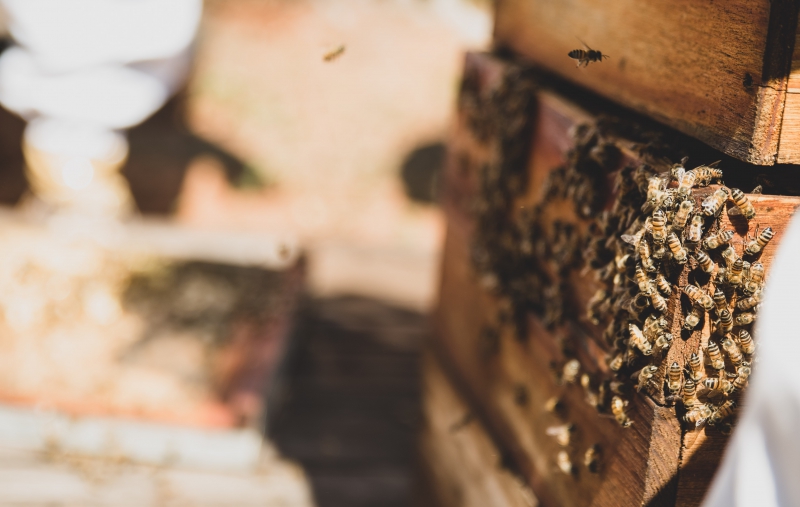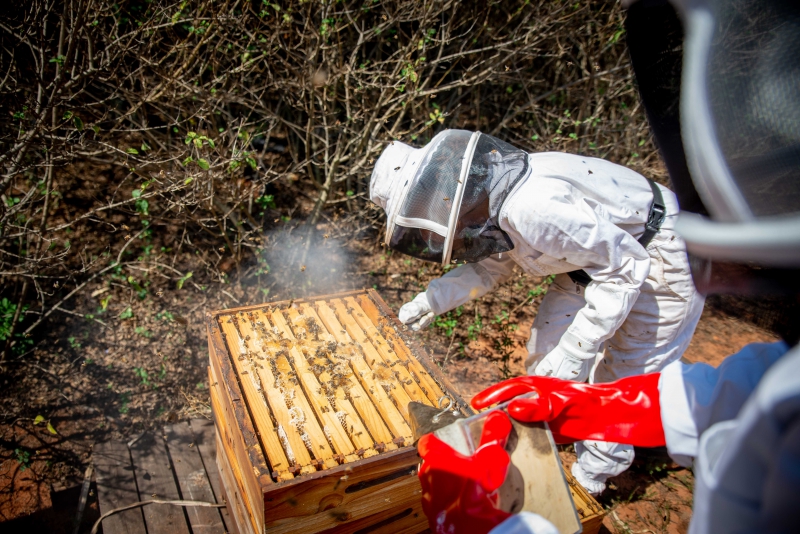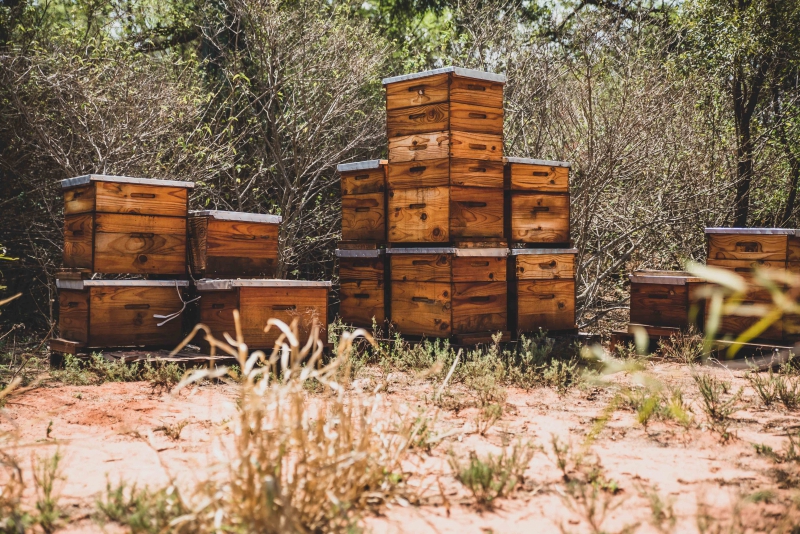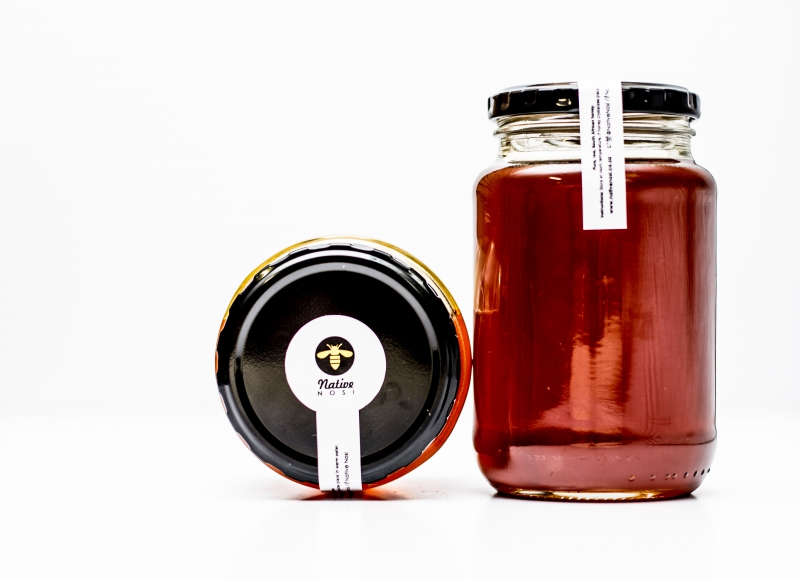Words by Mel Winter
We came around the corner with a gathered trail of children from the tour around the training facility. We could hear the noise from quite some distance. In the rudimentary wooden structure close to the out-of-sight, but distinctive buzzing, a tub of honey is cracked open. It does not taste like any honey I’ve ever tasted. It tastes like ripe mango, its texture is silky and viscous. This final product, so naturally sweet and so valued, comes from our little pollinating friends, the bees. While we may have gone to Mozambique to see the budding coffee growing project, coffee is only one part of Gorongosa’s plan to upskill and empower the community around the National Park to make sustainable incomes. Another of those avenues is bee-keeping.
The thing I’ve always loved about honey is that, to me, it tastes like sunshine. Bright and warm. The idea of bee-keeping and harvesting honey is fascinating. And while the bees are integral to our survival from a pollination sense, their produce has the capability to change a lot of lives too. The team at Gorongosa promote sustainable beekeeping practices, as environmentally friendly and high income potential enterprise for small-holding farm families. They help create sustainable livelihoods for communities while contributing to improve conservation of biodiversity and delivery of ecosystem services in the greater Gorongosa Landscape. And what about getting up close and personal with a swarm?! I always love seeing bees doing their work and collecting nectar from the different plants, but the very word swarm gives me the heebie-jeebies. I don’t think I’m alone in thinking that despite the specialised protective gear, you’ve got to be pretty brave to deal with thousands of tiny, determined and protective creatures. To understand more about this we consulted the local three generational bee-keeping team from Native Nosi based in Tshwane, Gauteng.

“My Grandfather was a crop and livestock farmer and kept a few beehives to help pollinate his crops, my father was particularly interested in the beekeeping and has been doing it all my life. I started selling his honey and when the demand grew, he suggested I get a few beehives to start making my own honey, and that’s how Native Nosi was born,” a passionate Mokgadi Mabela tells us. She is taking their bee-keeping skills to the next level and expanding their production. When I mention how different the honey in Gorongosa tasted, she explains why.
“The flower or crops the bees feed on to make honey always determine the colour, taste and thickness of the honey. Our bees are mostly exposed to Avocado, macadamia, sunflower, acacia, boekenhout (Buffalo Thorn) and multiflora (indigenous vegetation). The one thing we are very proud of is knowing that we give you what the bees have made. Honey is affected by many factors we have no control of including seasons, geographical location, forage and climate change. All those factors will determine the colour, taste and viscosity (thickness) of our honey. With that said, no two batches of pure honey will ever taste, look and feel the same. We fully rely on nature to make our honey and we share the product with the consumer as we receive it from the bees. We therefore encourage our clients to understand this, in order to understand why every batch is different. And the kind of client that appreciates nature is the kind of client that will appreciate every batch of our honey in all its facets of uniqueness. I take special pride in the fact that most of The Native Nosi’s Honey is Foraged in the Limpopo, Gauteng & North Western areas of South Africa. The bees are moved around every season to ensure that they always have enough forage to make their honey. So at any point the honey may differ in texture, colour & taste; depending on the different nectar the bees visit to make the honey.”

Even the same flower blooming in the same location may produce slightly different nectar from year to year, depending on temperature and rainfall, which will in turn affect the flavour of the honey. The harvesting of the honey is quite a tricky business and Mokgadi stresses that success will come to someone who genuinely loves the bees and is prepared to do their best for them to thrive.
“The behaviour of bees differs, just like all living things. Some swarms are more aggressive while others are less aggressive, others are “busier” than others, some swarms are stronger than others and obviously others smaller or bigger. I’m not sure about having a relationship with them,” she chuckles, “but obviously you do start to become attached to the swarms over time. The calmer you are when working on the bees the better the bees “behave”when you work on them and obviously this gets better with experience.”
Working on the bees involves a kind of dance involving ‘smoke’ and stamina and patience. Once you have mastered this dance you are rewarded with raw honey in its purest form.

“Raw honey means you have in the bottle what the bees made and only what the bees made, no additions, no processing, no heating etc. Irradiated honey means the honey has been processed to destroy any diseases that may be in the honey and delay crystallisation, this is a legal requirement for all imported honey. It is done to protect SA citizens but it also destroys all the enzymes that make honey beneficial. The honey at The Native Nosi is the best in the land, & I do nothing to the honey except extract it from the bees straight into your bottle, so the honey is as fresh & pure as the bees prepared it.”
Honey, or rather syrups posing as honey, came under fire in the recent past as many well-known brands were ousted for packaging these imposters as the real thing. We asked Mokgadi what consumers should be looking out for when they are scouring the shelves for the purest and most delicious honey.
“Try to buy local, look at the source always, you are looking for south African or African honey. Try to avoid honey imported from other continents altogether. As I said the importing regulations mean that it has had to undergo irradiation. If you know a beekeeper rather get your honey straight from them. Make sure you buy raw honey, and not irradiated honey and try to source from speciality shops (health shops, deli’s, farmers markets etc.) when you can.”
“The bee-keeping community can be bigger than what it currently is, as we currently import more honey than we make as a country. There’s a huge opportunity there. However, it is an industry that is white male dominated and will benefit from racial and sexual reform. It requires heavy capital to operate at commercial scale making it slightly challenging to penetrate for previously disadvantaged citizens who may have resource challenges.”
With buying local and pure you also get all the health benefits that honey is purported to carry, unlike with the processed options.
“Amongst other benefits is has antioxidant, antibacterial, antifungal and antiseptic properties. It is an effective prebiotic* which helps regulate the digestive system. It has cold suppressing properties and helps sooth throat infections.”
Throw a bit of that goodness in your coffee! Mokgadi agrees.
“Honey in coffee is a combination most of our clients are accustomed to. I believe the less strong honey flavours will work better with coffee as coffee has quite a defined taste. Flavours like acacia, sunflower, canola, should compliment coffee well. Although I am a tea drinker and only occasionally have coffee,” she laughs, “If I am to have a coffee it has to be at Press For Coffee in Faerie Glen Pretoria.”
Amazing to think that the combination of bees and flower nectar results in a product that’s existence we take so for granted most of the time. Mokgadi understands the gravity of her responsibility as a bee-keeper.
“Bees are critical for human survival, without bees we wont have fruits, vegetables, seeds and nuts, least of all honey.”
*This is not a typo! Prebiotics are in fact different to the more well-known probiotics, but both are good for your gut health! Prebiotics actually feed the bacteria in your gut, a food source for the friendly bacteria that make everything work smoothly in your intestinal tract. You learn something new everyday!
